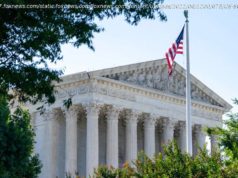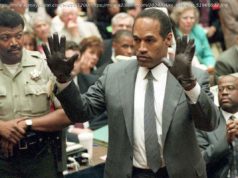President Trump ’s rhetoric has raised expectations for an ironclad nuclear deal with North Korea following his historic summit with Kim Jong Un, posing diplomatic…
President Trump ’s rhetoric has raised expectations for an ironclad nuclear deal with North Korea following his historic summit with Kim Jong Un, posing diplomatic and political risks for the White House if the unpredictable regime fails to follow through.
Trump even declared that North Korea no longer poses a nuclear threat, a statement contradicted by his own pick to serve as U. S. ambassador to South Korea, and a remark that experts said could be a serious mistake.
“Declaring victory prematurely is irresponsible because it sends the wrong message to the North Koreans about the expectations for the process,” said Kelsey Davenport, director of nonproliferation policy at the Arms Control Association.
North Korea has taken no verifiable steps toward dismantling its weapons program and the two sides still disagree on what it means to denuclearize.
By declaring the problem “solved,” as Trump did Friday, he is creating a disincentive for Pyongyang as it considers making concessions to Washington in nuclear talks.
“Trump has undercut his negotiators and made it more difficult for [Secretary of State Mike] Pompeo to lead a process to nail down the definition of complete denuclearization,” said Davenport.
Trump has made nuclear diplomacy with North Korea his no. 1 foreign policy goal and failing to secure an agreement would be a major blow both at home and abroad.
The president even acknowledged during a post-summit news conference the possibility his hopes for a deal could be dashed.
“I think he’s going to do these things,” he said of Kim. “I may be wrong. I mean, I may stand before you in six months and say, ‘Hey, I was wrong.’ I don’t know that I’ll ever admit that, but I’ll find some kind of an excuse.”
Pulling off the summit with Kim was an achievement for Trump, but he left Singapore without an agreement in hand guaranteeing the “complete, verifiable and irreversible” denuclearization of North Korea — the conditions the U. S. set for a deal.
Trump and Kim instead signed a joint statement that included a commitment from the North Koreans to “work toward the complete denuclearization of the Korean Peninsula” without spelling out how or when it will happen. North Korea has made such pledges in the past, only to violate them.
It will be up to Pompeo and his North Korean counterparts to work out the specifics of an elusive deal in the coming months.
Trump in the meantime has tried to soften the ground around the negotiating table by praising the brutal North Korean leader.
He told reporters traveling with him in Singapore they would be surprised at how “smart” and “talented” Kim is, calling him a “very good negotiator” who “wants to do the right thing” — all while brushing aside his abysmal human-rights record.
The rhetoric is part of a jarring shift in for Trump, who last year dubbed Kim “Little Rocket Man” and threatened him with nuclear annihilation.
The change has raised concerns the president might give too much away in pursuit of a deal, which could undercut the dealmaker image of Trump the White House has sought to paint.
Abraham Denmark, Asia director at the Woodrow Wilson International Center for Scholars, said Trump’s victory lap would not have a major effect “unless it leads to real changes in U. S. posture, U. S. readiness or the strength of our alliances.”
Trump announced after meeting with Kim he would suspend what he called “war games” with South Korea, a term the North Koreans use to describe joint military exercises between the U. S. and the South.
The move appeared to surprise military officials and foreign leaders and generated criticism from Republicans and Democrats in Washington.
“I don’t think that’s wise because we have done these exercises for years,” said Sen. Joni Ernst (R-Iowa), a key member of the Senate Armed Services Committee.
Pompeo clarified during a post-summit visit to South Korea the exercises would only remain on hold as long as North Korea continues engaging in good-faith talks.
Trump on Friday defended his rhetoric in pointed terms, rebuking a reporter at the White House who asked him why he is defending Kim’s human-rights record.
“You know why? Because I don’t want to see a nuclear weapon destroy you or your family, OK?”
Trump supporters also wave off concerns about the president’s comments, saying they are part of his typical modus operandi, which includes a flair for the dramatic.
“What other people on the outside might see as raising the expectations too high is what he sees as rising to the moment and many of his supporters will see it the same way,” said a former administration official.
“He likes to talk in broad strokes and in big ways,” added the former official. “That’s why he is successful. If he didn’t talk in such grandiose terms, he might not be president right now. It’s something that goes to marketing and PR 101.”
Trump’s defenders argue his remarks could pressure North Korea to behave well in exchange for concessions.
And they say Trump would have no qualms about turning on Kim just as quickly as he praised him if the talks break down.
“If Kim starts reneging on some of this stuff, if the negotiations fall apart, he’s going to call it out and call it out on a very public manner,” said the ex-official said of Trump. “If things go sideways, he’ll be tweeting ‘Little Rocket Man’ on a daily basis.”
Many Republicans thus far are giving Trump space to maneuver, but have also adopted a “prove it to me” attitude.
“I think Trump’s trying to take a distressed property toward North Korea and turn it into condos. We’ll see if it happens,” said Sen. Lindsey Graham (R-S. C.), an outspoken hawk on North Korea.
House Armed Services Committee Chairman Mac Thornberry (R-Texas) called Trump’s rhetoric “unconventional” but said it is possible it could pay dividends.
“I am more of a ‘speak softly, carry a big stick’ guy, but I think there’s no doubt that in addition to diplomatic isolation, economic sanctions, our military buildup… the president’s rhetoric gave North Korea pause,” he said.






